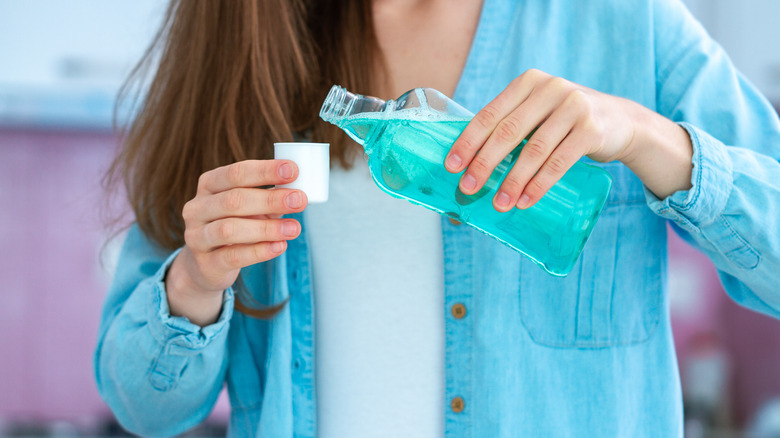How To Avoid A Dry Socket After Getting Your Tooth Removed
Having a tooth removed can feel like a relief, especially when you're in pain. Unfortunately, you may still experience some discomfort afterward. Up to 5.6% of people develop a painful dry socket postextraction, according to a 2014 study published in the International Journal of Dentistry. Researchers believe that cigarette smoking, clotting disorders, and certain medications such as birth control pills may contribute to this condition. How you care for your teeth and gums after the procedure matters, too.
In normal conditions, a blood clot forms over the socket where the extracted tooth used to be, which helps promote healing. A dry socket occurs when the blood clot becomes dislodged or fails to form, leaving the bone and nerves exposed. If that happens, you may see the bone in the socket and experience all sorts of symptoms such as bad breath, tenderness, and severe pain. These problems tend to worsen around two or three days following the extraction, says the Cleveland Clinic.
While it's not always possible to prevent a dry socket, there are steps you can take to mitigate the risks. For example, you may need to avoid certain foods and beverages that can irritate the extraction site. Maintaining good oral hygiene is a must.
Take these steps to prevent a dry socket and heal faster
The exact cause of dry sockets is unknown, but most experts agree that it's possible to avoid this problem. DentistryIQ recommends quitting smoking for at least 48 hours following the procedure. Smoking can affect blood flow to the area where your tooth was, and prevent the clot from forming. Moreover, smoking suppresses immune function and may increase the risk of infection, notes a 2008 review featured in the Indian Journal of Dental Research.
What you eat and drink after a tooth extraction can make all the difference. Generally, it's best to avoid hard, chewy, or sticky foods in the first few days following the surgery, suggests Colgate. Steer clear of coffee, alcohol, soft drinks, and carbonated beverages, and drink plenty of water. The experts at Atlanta Dentures recommend sticking to soft foods like yogurt, applesauce, and ice cream in the first 24 hours. As a rule of thumb, avoid hot foods and drinks, and don't spit or drink through a straw.
Another thing you can do to prevent dry sockets is to gently rinse your mouth with warm salt water or chlorhexidine mouthwashes. Do it several times throughout the day, especially after eating. Saline rinses help remove food residues, while chlorhexidine may inhibit bacterial growth, explains DentistryIQ. Start your rinses on the day after the extraction, suggests Medical News Today. Last but not least, avoid physically demanding activities and get more rest so your body can heal properly.


